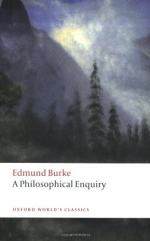
|
| Name: _________________________ | Period: ___________________ |
This test consists of 5 short answer questions, 10 short essay questions, and 1 (of 3) essay topics.
Short Answer Questions
1. How does Burke define sympathy?
2. Burke opines that buildings that are great only in dimension are:
3. What attracts people to one another, argues Burke?
4. How does Burke define "magnificence?"
5. Why are the cries of animals sublime, according to Burke?
Short Essay Questions
1. What are some of the cautions or caveats Burke offers to his readers in the Second Preface?
2. According to Burke, why can grief be considered pleasurable?
3. Summarize Burke's section about the role of smells and tastes relating to the sublime.
4. What types of colors are productive of the sublime, and which colors are not, according to Burke?
5. What does Burke argue about tastes that deviate from causes other than habit or use?
6. What qualities of sound produce the sublime, according to Burke?
7. What does Burke identify as the central tension between the imagination and the judgment?
8. What significance do obscurity and clarity have to the sublime?
9. What, according to Burke, is sublime about religion?
10. What is astonishment, according to Burke, and why is it important?
Essay Topics
Write an essay for ONE of the following topics:
Essay Topic 1
Describe Burke's definition of the sublime. What passions or sensations fuel it? What is the significance of pain and pleasure to the sublime? Describe Burke's ideas of the passions belonging to self-preservation and the passions belonging to society. What are the key differences between them? Give at least three examples of things which would be considered sublime, and explain the relevance of these examples.
Essay Topic 2
Paraphrase Burke's definition of beauty and the distinction he makes between love and lust or desire. What relation does beauty have to the sublime? Through which faculties does one experience, understand, and interpret that which is beautiful? How are love and lust/desire different, and can they ever coexist?
Essay Topic 3
Summarize Locke's idea of the nature of darkness and Burke's idea of the nature of darkness. Where do they differ? Why does Burke think differently than Locke, and what examples does he use to support his opinion? How does darkness affect the body and the mind, according to Burke? Do you think the cultural associations we have with darkness (the general theme of it and the common things it symbolizes) can be relevant to our view of darkness, in addition to or instead of Burke's opinion of darkness' nature?
|
This section contains 1,025 words (approx. 4 pages at 300 words per page) |

|




